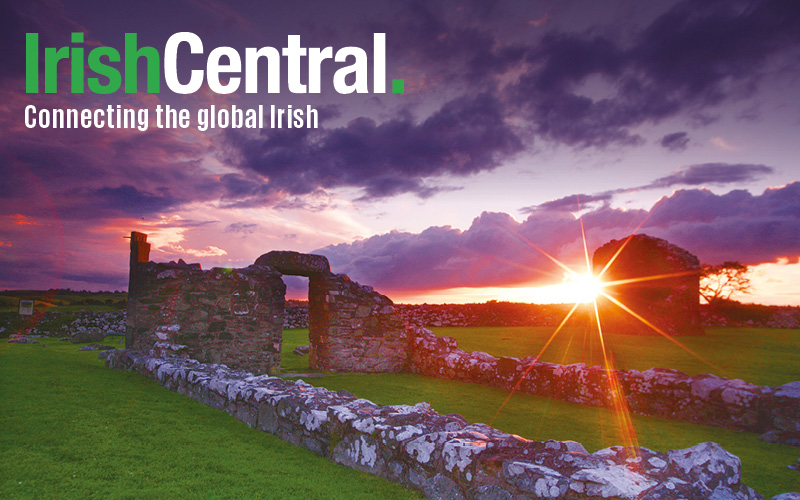The start of a new year makes most people a little reflective and there's no better way to begin that stocktaking process than with an Irish book.
2017 was a banner year in Irish publishing and we'd like to bring some of its standouts to your attention again.
"1916, One Hundred Years Of Irish Independence"
"1916, One Hundred Years Of Irish Independence" by Tim Pat Coogan was a sobering rejoinder to the latest breathless reports of economic progress and rising house prices.
Don't forget the hard lessons of the 2008 banking collapse when the Irish government, the International Monetary Fund and the European Central Bank conspired to present every Irish person with the bill through a series of bone deep social cuts and raised taxes, Coogan reminds us.

Does the Ireland of 2018 live up to the ideals of 1916?
2008 taught us not only that the emperors of Irish finance, “had no clothes, but that the Irish people would have to buy them a whole new wardrobe.” It's also one of the best ways to assess the legacy of 1916 the author argues, by underlining just how far from it our political leadership have strayed.
Thomas Dunne Books, $26.99.
"A State In Denial, British Collaboration with Loyalist Paramilitaries"
"A State In Denial, British Collaboration with Loyalist Paramilitaries" by Margaret Urwin explores the toxic web of relationships that existed between the top echelons of British establishment, senior civil servants, police and military officers, British intelligence services and the loyalist paramilitaries in the North.
Read more: Literature, film and music - 2017 was the year of the Irish renaissance

A State In Denial, British Collaboration with Loyalist Paramilitaries by Margaret Urwin
A State In Denial lays out just how far reaching the collusion between British politicians, the security services and the loyalist paramilitaries actually was. From black sites, secret army units, sectarian screening, dirty tricks, arming the loyalist gangs, and their two-decade-long refusal to hold them to account under the law, the fact of collaboration between successive British governments and the loyalist paramilitaries is now an utterly unarguable fact Urwin argues.
Dufour, $21.00.
"In Handbook Of The Irish Revival: An Anthology of Irish Cultural and Political Writings 1891-1922"
"In Handbook Of The Irish Revival: An Anthology of Irish Cultural and Political Writings 1891-1922" edited by Declan Kiberd and P.J. Matthews argue that poets, playwrights and novelists were at the epicenter of the Irish revolutionary generation and they numbered among its most far seeing political thinkers and activists.
Read more: Twenty Irish novels to read before you die

Handbook Of The Irish Revival: An Anthology of Irish Cultural and Political Writings 1891-1922 edited by Declan Kiberd and P.J. Matthews
Kiberd and Matthews want to give the cultural revolution that preceded the political one it's due by assembling the essays, articles and letters of the preeminent (and lesser known) artists that paved the way to the Rising and its aftermath. As this vivid book reminds us, a new generation of activists and visionaries was revitalizing the culture in an act of reclamation and transformation that dazzles and has yet to be fully appreciated.
Notre Dame Press, $25.00.

A Line Made By Walking
Rural Ireland hasn’t been a major subject for most of our contemporary fiction writers in recent years. Most often it’s a place to escape from or and rarely to linger in. But for award-winning novelist Sara Baume its the source of endless creative inspiration – as well as quite a bit of irritation.
Alone, and dying of it, Frankie, the solitary 20-something artist she introduces us to at the start of "A Line Made By Walking," has retreated to her family's vacant house in the country to cobble together the story of herself in a moving effort to make sense of her past whilst climbing out of an imprisoning depression.
The Irish countryside doesn’t sugarcoat its life lessons and neither does Baum’s brittle but quietly ferocious character. A novel about creativity and the long shadows it casts over a life.
HMH, $25.00.
Read more: The top twenty books every Irish American should read

Poverty In Ireland, 1837, A Hungarian’s View by Baron Jozsef Eotvos
The first thing the book does is demolish the fiction that Irish people were well-fed before the famine. Ten years before it started they were already half starving in the streets he discovered. Food security was simply non-existent and the degree of poverty, exploitation and hopelessness he witnessed were the worst he’d ever seen.
He called Ireland “the land of sufferings” and was assailed by beggers the moment he stepped off the boat that brought him to its shores. Everywhere he went north and south people were in rags, the traces of hunger or disease clearly visible on their faces.
Forced to pay absentee landlords biting rents to live in their own country, the cruelty and absurdity of their situation broke his heart. What makes him so unique and so worthy of reading is that he toured Ireland in the very first year of Queen Victoria’s reign, and unlike the Anglo Irish aristocracy he clearly discerned the danger their chauvinistic belief in their religious and racial superiority would spell for the natives and the country in the terrible years to come.
Phaeton, $18.95.




Comments